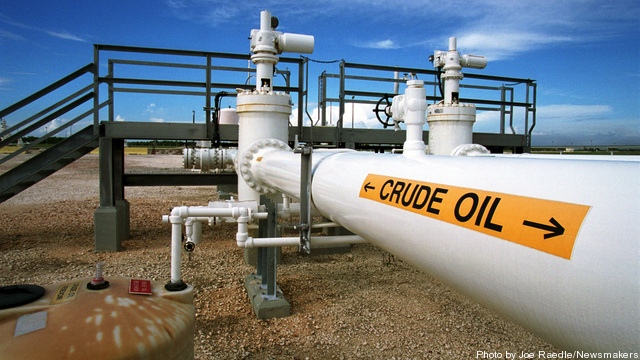
While national opposition to the controversial Keystone XL pipeline project has focused on the environmental risks of pumping synthetic crude from Alberta’s oil sands across the United States to Gulf Coast refineries, it’s the issue of eminent domain that has riled critics in Texas.
Several appeals have been filed by Texas landowners trying to resist the efforts of pipeline company TransCanada to use a local law to force reluctant landowners to permit construction of a southern extension of the line from Cushing, Oklahoma to Nederland, Texas.
While the overall Keystone XL project has not yet been approved, the 485-mile section is now under construction because it will – at least initially – carry only domestic crude oil without crossing an international boundary and so does not need the go-ahead from President Obama.
The southern stretch, named simply the Gulf Coast Pipeline Project, will provide needed additional capacity to transport growing crude supplies from North Dakota, Oklahoma, Montana and elsewhere to the extensive refinery complex on the US Gulf Coast.
TransCanada says it needs a 50-foot strip of land the length of the pipeline, and that “well over 90 percent” of landowners in Texas have voluntarily agreed to allow construction on their land, said company spokesman David Dodson. The total amount of land needed for pipeline construction is about 2,800 acres, he said.
He said acquisition of easements for use of land for the pipeline, is “pretty much done” and construction is in its early stages. The pipeline is expected to begin operation by the end of 2013.
For the minority of landowners who are resisting construction, the company argues it has a right to use their land because it meets the Texas Railroad Commission’s requirements as a “common carrier” of petroleum products, meaning the pipeline would be accessible to anyone who wants to pay to use it.
Dodson denied critics’ claims that there’s any restriction on use of the pipeline by other parties who enter into an agreement to transport its products. “If you come to us and say you want to transport your product on the pipeline, we are bound to provide that transport,” he told Breaking Energy.
Landowners Battle 100-Year-Old Law
But Julia Trigg Crawford, a Texas farmer who is seeking a court order to prevent TransCanada from building the pipeline on her land, rejected the company’s argument that the pipeline, once built, would allow anyone to use it.
“There’s only two places you can get on the pipeline – Cushing or Houston,” Crawford said.
Crawford, who farms 650 acres of wheat and soybeans near Paris, Texas, lost a district court case in August when a judge ruled that TransCanada does qualify as a common carrier, and so can take eminent domain on Crawford’s family farm. She’s appealing the ruling to the Sixth Circuit Court of Appeals in early November.
Another landowner, 78-year-old Eleanor Fairchild, was arrested on Oct. 4, along with actress Darryl Hannah, for trying to halt construction of the pipeline on Fairchild’s land at Winnsboro in northeast Texas.
It’s Texas law – this isn’t the first pipeline built under this law.” – Dodson
The pipeline would take only about two acres of her land but Crawford says she’s fighting for the principle of controlling her own property. So far, only archaeological studies have taken place on her land but she said she can see newly constructed sections of pipeline on nearby property.
In a state that has always been heavily dependent on oil, Crawford acknowledged she’s in a minority in resisting the industry but said she’s motivated by what she called TransCanada’s “bullying” tactics, and by the fact that it is a foreign corporation, whose product she said seems likely to be sent for export rather than to increase North American energy independence.
She also criticized the Railroad Commission’s rules that allow a company to declare itself a common carrier just by filling out a one-page document.
But Dodson said there’s long precedent for eminent domain under a Texas law that dates to 1917. “This is not TransCanada policy,” he said. “It’s Texas law – this isn’t the first pipeline built under this law.”
